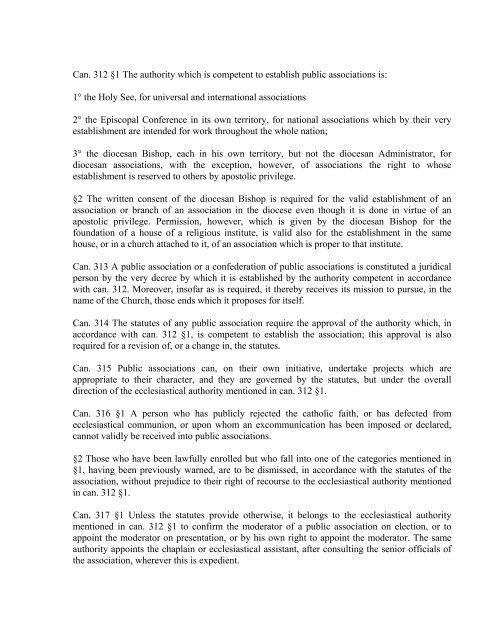Code_of_Canon_Law
Code_of_Canon_Law
Code_of_Canon_Law
Create successful ePaper yourself
Turn your PDF publications into a flip-book with our unique Google optimized e-Paper software.
Can. 312 §1 The authority which is competent to establish public associations is:<br />
1° the Holy See, for universal and international associations<br />
2° the Episcopal Conference in its own territory, for national associations which by their very<br />
establishment are intended for work throughout the whole nation;<br />
3° the diocesan Bishop, each in his own territory, but not the diocesan Administrator, for<br />
diocesan associations, with the exception, however, <strong>of</strong> associations the right to whose<br />
establishment is reserved to others by apostolic privilege.<br />
§2 The written consent <strong>of</strong> the diocesan Bishop is required for the valid establishment <strong>of</strong> an<br />
association or branch <strong>of</strong> an association in the diocese even though it is done in virtue <strong>of</strong> an<br />
apostolic privilege. Permission, however, which is given by the diocesan Bishop for the<br />
foundation <strong>of</strong> a house <strong>of</strong> a religious institute, is valid also for the establishment in the same<br />
house, or in a church attached to it, <strong>of</strong> an association which is proper to that institute.<br />
Can. 313 A public association or a confederation <strong>of</strong> public associations is constituted a juridical<br />
person by the very decree by which it is established by the authority competent in accordance<br />
with can. 312. Moreover, ins<strong>of</strong>ar as is required, it thereby receives its mission to pursue, in the<br />
name <strong>of</strong> the Church, those ends which it proposes for itself.<br />
Can. 314 The statutes <strong>of</strong> any public association require the approval <strong>of</strong> the authority which, in<br />
accordance with can. 312 §1, is competent to establish the association; this approval is also<br />
required for a revision <strong>of</strong>, or a change in, the statutes.<br />
Can. 315 Public associations can, on their own initiative, undertake projects which are<br />
appropriate to their character, and they are governed by the statutes, but under the overall<br />
direction <strong>of</strong> the ecclesiastical authority mentioned in can. 312 §1.<br />
Can. 316 §1 A person who has publicly rejected the catholic faith, or has defected from<br />
ecclesiastical communion, or upon whom an excommunication has been imposed or declared,<br />
cannot validly be received into public associations.<br />
§2 Those who have been lawfully enrolled but who fall into one <strong>of</strong> the categories mentioned in<br />
§1, having been previously warned, are to be dismissed, in accordance with the statutes <strong>of</strong> the<br />
association, without prejudice to their right <strong>of</strong> recourse to the ecclesiastical authority mentioned<br />
in can. 312 §1.<br />
Can. 317 §1 Unless the statutes provide otherwise, it belongs to the ecclesiastical authority<br />
mentioned in can. 312 §1 to confirm the moderator <strong>of</strong> a public association on election, or to<br />
appoint the moderator on presentation, or by his own right to appoint the moderator. The same<br />
authority appoints the chaplain or ecclesiastical assistant, after consulting the senior <strong>of</strong>ficials <strong>of</strong><br />
the association, wherever this is expedient.












![[Pham_Sherisse]_Frommer's_Southeast_Asia(Book4You)](https://img.yumpu.com/38206466/1/166x260/pham-sherisse-frommers-southeast-asiabook4you.jpg?quality=85)




